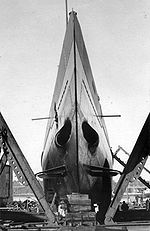Vetehinen-class submarine: Difference between revisions
Tom.Reding (talk | contribs) m Fix Category:Pages using deprecated image syntax (default size specified); WP:GenFixes on, using AWB |
Derekbridges (talk | contribs) fix template links |
||
| Line 67: | Line 67: | ||
{{Vetehinen class submarines}} |
{{Vetehinen class submarines}} |
||
{{WWII Finnish ships}} |
|||
{{WWIIFINShips}} |
|||
{{DEFAULTSORT:Vetehinen class submarine}} |
{{DEFAULTSORT:Vetehinen class submarine}} |
||
Revision as of 22:23, 25 August 2021
This article includes a list of references, related reading, or external links, but its sources remain unclear because it lacks inline citations. (January 2013) |
 Vetehinen during her launching ceremony.
| |
| Class overview | |
|---|---|
| Name | Vetehinen class |
| Builders | Crichton-Vulcan |
| Operators | |
| Completed | 3 |
| General characteristics | |
| Type | Submarine |
| Displacement | 493 tonnes surfaced, 716 tonnes submerged |
| Length | 63.5 m (208.3 ft) |
| Beam | 6.2 m (20.3 ft) |
| Draught | 3.6 m (11.8 ft) |
| Propulsion | Diesel-electric, 1,016 hp (758 kW) |
| Speed | 12.6 knots (23.3 km/h) surfaced, 8.5 knots (15.7 km/h) submerged |
| Range | 1,575 nmi (2,917 km) at 10 knots (19 km/h) surfaced, 75 nmi (139 km) at 4 knots (7.4 km/h) submerged |
| Complement | 30 men |
| Armament | |


The Vetehinen-class submarine was a Finnish 500 tonne submarine class of three vessels that was designed and built in the 1920s and early 1930s. The Vetehinen class served in the Finnish Navy during World War II. The class was designed by Dutch dummy company Ingenieurskantoor voor Scheepsbouw den Haag (I.v.S) (set up by Germany after World War I in order to maintain and develop German submarine know-how and to circumvent the limitations set by the Treaty of Versailles) and built by the Finnish Crichton-Vulcan shipyard in Turku. The class was based on the German World War I Type UB III and Type UC III submarines and served as prototype for Type VII submarines.
The word vetehinen means a merman. Vetehinen-class submarines were designed as minelaying submarines and were built with mineshafts for 20 mines. Submarines had special inner rails for two torpedo tubes to enable 450 mm (18 in) torpedoes to be used instead of the 533 mm (21 in) torpedoes.
Submarines of the class

